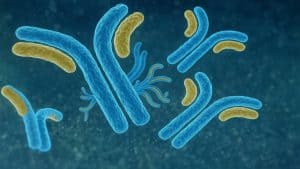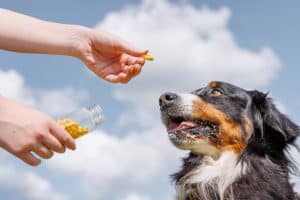The effects and benefits of colostrum (foremilk) for dogs
Colostrum is the foremilk produced in the first few days after birth, found in all mammals – including humans, dogs, and cattle. While humans are born with a basic level of immune protection, many mammals, such as puppies and calves, are not. They receive their first immune information from the colostrum of their mother, which “kickstarts” their immune system. This is why bovine colostrum contains over forty times the concentration of immune factors compared to that of humans. If you are curious to see what natural foremilk supplements for dogs are available, you can find the full list here.
In addition to being highly nutritious, this first milk contains unique compounds in concentrations not found elsewhere. These bioactive ingredients support immune function, enhance the body’s defenses, and promote regeneration in dogs.
Colostrum’s health-promoting compounds
Immunoglobulins
 Immunoglobulins, also known as antibodies, are the body’s key defense weapons against pathogens. They are found in extremely high concentrations in foremilk, playing a vital role in initiating the newborn puppy’s immune system. The most important ones are IgA, IgG, and IgM.
Immunoglobulins, also known as antibodies, are the body’s key defense weapons against pathogens. They are found in extremely high concentrations in foremilk, playing a vital role in initiating the newborn puppy’s immune system. The most important ones are IgA, IgG, and IgM.
- IgA: Keeps viruses and bacteria inside the digestive tract and prevents them from entering the bloodstream. Deficiency can lead to chronic enteritis and diarrhea in dogs.
- IgG: Provides passive immunity to newborn puppies until their own immune system matures.
- IgM: The first antibody produced by newborns, forming the initial defense line against viruses.
PRPs – Proline-Rich Polypeptides
PRPs, also known as colostrinin, fine-tune the immune system. With antiviral, antibacterial, and anti-tumor effects, they can regulate immune responses: stimulating them when too weak and suppressing them when overactive (as in allergies). This makes them especially important for dogs with infections, allergies, or autoimmune disorders.
MSM
MSM (methylsulfonylmethane) is a natural sulfur compound that can help protect cartilage, reduce inflammation, and support wound healing in dogs. Clinical studies suggest it may lower the release of cytokines and prostaglandins, making it useful as supportive therapy in allergies and cancer-related conditions.
Growth factors
Colostrum growth factors stimulate cellular renewal and promote the regeneration of muscles, bones, connective tissues, and gut flora. This is especially important in dogs with tissue damage or leaky gut syndrome.
Lactoferrin
Lactoferrin is a multifunctional protein with antiviral, antifungal, antimicrobial, and antiparasitic properties. It destroys pathogens that trigger inflammation, while supporting a healthy gut microbiome as a prebiotic. This strengthens digestion and immune defense in dogs.
Our selected colostrum-based products for dogs can help maintain your pet’s immune system and vitality.
Foremilk and Gut Flora
Colostrum not only strengthens immunity directly, but also supports balance in gut flora. Lactoferrin and immunoglobulins foster the growth of beneficial bacteria while limiting harmful ones. This enhances the effectiveness of probiotics in dogs.
Conditions Where Colostrum May Help Dogs
Allergies
Allergies are an overreaction of the immune system to harmless substances. PRPs in foremilk can help calm this response, while MSM relieves itching, rashes, and inflammation in dogs.
Leaky Gut Syndrome
In dogs with leaky gut syndrome, damaged intestinal lining allows undigested food particles to enter the bloodstream, triggering inflammation and allergies. Lactoferrin in colostrum works as a prebiotic, restoring gut flora and reducing inflammation.
Diarrhea
Research shows colostrum is effective for acute, chronic, and infectious diarrhea in dogs. Lactoferrin lowers harmful bacteria and improves stool quality.
Autoimmune Disorders
Dogs are increasingly affected by autoimmune conditions. PRPs in colostrum can moderate immune overactivity, while immunoglobulins and lactoferrin help defend against pathogens that worsen symptoms.
Colostrum and Cancer
Colostrum may support dogs with cancer. Immunoglobulins strengthen defenses, cytokines activate white blood cells, and lactalbumin has been shown to trigger apoptosis in tumor cells without harming healthy ones.
Arthritis and Joint Degeneration
MSM reduces inflammation and improves joint mobility, while growth factors repair cartilage and connective tissues. Colostrum can therefore help relieve pain and support joint health in dogs.
Oral Health
Studies suggest foremilk may reduce gum disease-causing bacteria, helping prevent tooth loss. Growth factors also promote gum and oral mucosa regeneration in dogs.
Important! Colostrum is essentially milk, so it should be used with caution in dogs with dairy allergies.
If you’d like to try it, check out our available foremilk supplements for dogs here.
References:
- Pakkanen, R., & Aalto, J. (1997). Growth factors and antimicrobial factors of bovine colostrum. Food Research International, 30(9), 755–759.
- Playford, R. J., et al. (2000). Bovine colostrum is a health food supplement which prevents NSAID induced gut damage. Gut, 44(5), 653–658.
- Gopal, P. K., & Gill, H. S. (2000). Oligosaccharides and glycoconjugates in bovine milk and colostrum. British Journal of Nutrition, 84(S1), 69–74.
- Struff, W. G., & Sprotte, G. (2007). Bovine colostrum as a biologic in clinical medicine: A review. International Journal of Clinical Pharmacology and Therapeutics, 45(5), 193–202.
- Sarker, S. A., et al. (1998). Successful treatment of rotavirus diarrhea in children with immunoglobulin from immunized bovine colostrum. Pediatric Infectious Disease Journal, 17(12), 1149–1154.
- Buckley, J. D., Butler, R. N., Southcott, E., & Brinkworth, G. D. (2009). Bovine colostrum supplementation reduces intestinal permeability induced by non-steroidal anti-inflammatory drugs. Nutrients, 1(3), 224–234.


